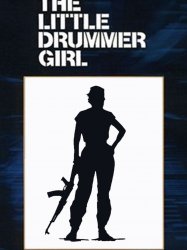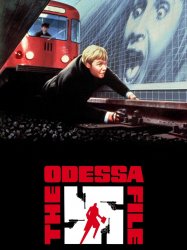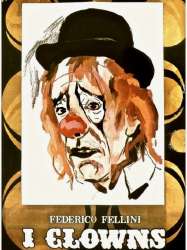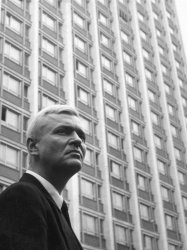Bavaria Film

Filmography of Bavaria Film (110 films)
Production

Silence Like Glass (1989)
, 1h43Directed by Carl Schenkel
Origin German
Genres Drama
Actors Jami Gertz, Martha Plimpton, George Peppard, Gayle Hunnicutt, Bruce Payne, Rip Torn
The main character of the film, Eva, is a wealthy, snobbish ballerina who is diagnosed with cancer. She is admitted into the youth cancer ward at a hospital where she is forced into humility by her disease. She rooms with fellow cancer patient Claudia (Martha Plimpton), and the majority of the film revolves around their interactions together in their hospital room. She is treated with 'concern and compassion' by Dr Burton.

To Kill a Dragon (1988)
, 1h56Directed by Mark Zakharov
Origin Russie
Genres Drama, Fantasy
Themes Films about magic and magicians, Théâtre, Films about dragons, Films based on plays, Dystopian films
Actors Aleksandr Abdulov, Oleg Yankovsky, Evgueni Leonov, Viatcheslav Tikhonov, Alexandre Zbrouïev, Semion Farada
Le bon chevalier Lancelot arrive dans une ville pour la délivrer du dragon qui l'opprime depuis 400 ans. Cependant, presque tout le monde en commençant par le burgrave s'attellent à l'en dissuader, car ils ignorent ce que c'est qu'une liberté et au fond la redoutent. Il fait connaissance du dragon. Lors de leur rencontre Lancelot peut mesurer par lui-même le degré d'acceptation de son sort par un commun et mortel qui à l'instar de Friedrichsen, un scientiste corrigé, ne se révolte pas à l'idée de sa propre castration.

The NeverEnding Story (1984)
, 1h34Directed by Wolfgang Petersen
Origin German
Genres Drama, Science fiction, Fantastic, Fantasy, Adventure, Horror
Themes L'adolescence, Films about animals, Inspiré de l'univers des contes et légendes, Films about education, Films about children, Films about magic and magicians, Monde imaginaire, Films about religion, Films about dragons, L'enfance marginalisée, Films about Jews and Judaism, Children's films, Golem, Films about school violence
Actors Noah Hathaway, Barret Oliver, Tami Stronach, Moses Gunn, Thomas Hill, Alan Oppenheimer
Bastian Balthazar Bux (Barret Oliver), a shy and friendless bibliophile child, hides in a bookstore, interrupting the grumpy bookseller, Mr. Coreander (Thomas Hill). Bastian asks about one of the books he sees, but Mr. Coreander advises against it; despite which, Bastian seizes the book, leaving a note promising to return it, and hides in the school's attic to read. The book describes the world of Fantasia threatened by a force called "The Nothing"; where the Childlike Empress (Tami Stronach) who rules over Fantasia has fallen ill, and has summoned Atreyu (Noah Hathaway) to discover the cure. Atreyu is therefore given the AURYN. As Atreyu sets out, the Nothing summons Gmork (voiced by Alan Oppenheimer), a werewolf, to kill Atreyu.

The Little Drummer Girl (1984)
, 2h10Directed by George Roy Hill
Origin USA
Genres Thriller, Spy
Themes Spy films, Political films
Actors Diane Keaton, Klaus Kinski, Sami Frey, Thorley Walters, Eli Danker, Julian Firth
Set in Europe and the Middle East, the plot follows the Mossad's clandestine attempt to flush out a PLO bomber named Khalil. To capture him, they kidnap and later kill his brother, then recruit an anti-Zionist American actress named Charlie to impersonate the dead man's girlfriend, hoping Khalil will contact her. Charlie does everything the Mossad asks of her, but as she goes deeply undercover, she questions just how far she should go before reaching a point where she is unable to escape.

The Roaring Fifties (1983)
, 2h6Directed by Peter Zadek
Origin German
Genres Drama, Comedy
Actors Boy Gobert, Peter Kern, Christine Kaufmann, Sunnyi Melles, Beatrice Richter, Eva Mattes
La Seconde Guerre mondiale est finie. Jakob Formann, ancien prisonnier de guerre, rentre chez lui. À Linz, il trouve du travail comme interprète pour l'armée américaine. Il se procure 40 000 œufs auprès des Américains et fonde un élevage de poulets. La ferme qu'il acquiert a appartenu à Heinrich Himmler. Le miracle économique de Jakob Formann commence. Il devient un homme d'affaires de la jeune République fédérale. Il acquiert des sociétés de construction et d'édition. Formann mène une vie de luxe. Mais le premier choc pétrolier de 1973 met fin à l'ascension du petit-bourgeois. Formann vend sa firme à un consortium de banques. Mais il n'est pas malheureux. Il prend sa retraite en compagnie de sa compagne Julia.

Das Boot (1981)
, 2h29Directed by Wolfgang Petersen
Origin German
Genres Drama, War, Action, Adventure, Historical
Themes Seafaring films, Transport films, La bataille de l'Atlantique, Underwater action films, Submarine films, Political films
Actors Jürgen Prochnow, Herbert Grönemeyer, Martin Semmelrogge, Otto Sander, Sky du Mont, Erwin Leder
The story is told from the viewpoint of Lt. Werner (Herbert Grönemeyer), who has been assigned as a war correspondent on the German submarine U-96 in October 1941. He meets its captain (Jürgen Prochnow), chief engineer (Klaus Wennemann), and the crew in a French nightclub. Thomsen (Otto Sander), another captain, gives a crude drunken speech to celebrate his Ritterkreuz award, in which he openly mocks not only Winston Churchill but implicitly Adolf Hitler as well.

The Child Woman (1980)
, 1h40Origin France
Genres Drama
Actors Klaus Kinski, Pénélope Palmer, Michel Robin, Hélène Surgère, Georges Lucas
Élisabeth, treize ans, vit dans un faubourg industriel du Nord de la France. Douée pour la musique, elle joue de l'orgue à l'église locale, alors que ses parents ne s'intéressent qu'à leur salon de coiffure. Depuis trois ans déjà, Élisabeth a en secret une relation amoureuse avec Marcel, un homme de 45 ans à qui elle rend visite chaque matin avant l'école, faisant un crochet à vélo jusqu'à sa maison solitaire au milieu des bois.

The Odessa File (1974)
, 2h3Directed by Ronald Neame
Origin United-kingdom
Genres Drama, Thriller, Spy
Themes Films about writers, Spy films, Films about journalists, Political films
Actors Jon Voight, Maximilian Schell, Maria Schell, Derek Jacobi, Peter Jeffrey, Mary Tamm
On 22 November 1963, the day John F. Kennedy was assassinated in Dallas, Peter Miller, a young freelance reporter, pulls over to the curb to listen to a radio report of the event in a district in Hamburg, West Germany. As a result he happens to be stopped at a traffic signal as an ambulance passes by on a highway. He chases the ambulance and discovers it is en route to pick up the body of an elderly Jewish Holocaust survivor who had committed suicide, leaving behind no family. The reporter obtains the diary of the man, which contains information on his life in the Second World War Riga Ghetto, and the name of the SS officer who ran the camp, Eduard Roschmann.
 , 1h40
, 1h40Directed by Jean Renoir
Origin France
Genres Drama
Actors Jeanne Moreau, Roland Bertin, Jean Carmet, André Dumas, Françoise Arnoul, Robert Lombard
Le Petit Théâtre de Jean Renoir est un film de Jean Renoir comprenant 4 sketches, diffusé en 1970 à la télévision et seulement exploité en salles à partir de 1975 : I - Le Dernier réveillon, II – La Cireuse électrique, III – Quand l’amour meurt, IV – Le roi d’Yvetot.

The Clowns (1970)
, 1h32Directed by Federico Fellini
Origin France
Genres Drama, Science fiction, Comedy, Documentary, Fantasy
Themes Circus films
Actors Federico Fellini, Anita Ekberg, Pierre Étaix, Liana Orfei, Annie Fratellini, Victoria Chaplin
Depuis sa précoce enfance, Fellini est attiré, voire subjugué, par le cirque. Il entreprend ici une sorte de voyage nostalgique à la rencontre des anciens clowns et de leurs souvenirs.

Drei Liebesbriefe aus Tirol (1962)
, 1h46Directed by Werner Jacobs
Origin Austria
Genres Comedy, Musical
Themes Films about music and musicians, Musical films
Actors Ann Smyrner, Trude Herr, Hans Moser, Paul Hörbiger, Rudolf Carl, Annie Rosar
Le jeune Martin Hinterkirchner a quitté le village de Himmelsberg pour se rendre à Vienne, où il a obtenu un emploi de répétiteur à l'opéra. C'est une désillusion : le travail n'est qu'un poste d'assistant. Martin doit donc vivre chez l'ancienne chanteuse d’opéra Cäsarina Zwanziger et être son pianiste. Il écrit secrètement, soutenu par le fils de Cäsarina Peter, du schlager qu'il soumet au manager de musique Cobold. Surtout pour la chanson La Serenata qu'il a écrite pour la star schlager Linda Borg, mais elle est d'abord présentée à la manager de Linda, Isolde Fürchtenich, tombe dans la main, qui n'en veut pas. Martin est déçu et pense que Linda est maintenant une personne arrogante. Le grand-père de Martin, Leopold, qui arrive à l'exposition canine à Vienne avec son teckel Seppl, est impressionné par Linda. Quand le jury exclut Seppl au premier tour à cause de son pedigree manquant, c'est Linda qui fait l'éloge du "chien de race".

The Vikings (1958)
, 1h56Directed by Richard Fleischer
Origin USA
Genres Drama, War, Action, Adventure, Historical, Romance
Themes Seafaring films, Transport films, Films set in the Viking Age
Actors Kirk Douglas, Tony Curtis, Janet Leigh, Ernest Borgnine, James Donald, Alexander Knox
The King of Northumbria is killed during a Viking raid led by the fearsome Ragnar (Ernest Borgnine). Because the king had died childless, his cousin Aella (Frank Thring) takes the throne. The king's widow, however, is pregnant with what she knows is Ragnar's child because he had raped her during that fateful raid, and to protect the infant from her cousin-in-law's ambitions, she sends him off to Italy. By a twist of fate, the ship is intercepted by the Vikings, who are unaware of the child's kinship, and enslave him.

The Spessart Inn (1958)
, 1h39Directed by Kurt Hoffmann
Origin German
Genres Comedy, Musical theatre, Adventure, Musical
Themes Films about sexuality, LGBT-related films, Transgender in film, Musical films, LGBT-related films, LGBT-related film, Cross-dressing in film
Actors Liselotte Pulver, Carlos Thompson, Günther Lüders, Wolfgang Neuss, Ina Peters, Hubert von Meyerinck
In the late years of the 18th century, Felix and Peter, two journeymen, are travelling across the Spessart hills to Würzburg. Scared of the bandits that plague these parts, especially after a brief encounter with them, the two are glad to find an inn in the middle of the forest. However, it turns out that they have wandered into a den of thieves. The owners are in league with the bandits, who this very night plan to abduct Franziska, the Comtesse von Sandau, who is travelling through the forest with a group including her fiancé, Baron Sperling. Their coach is waylaid by a trap and the bandits direct them to the nearby inn. The waitress warns the journeymen of impending danger and they pass on the warning to the nobles. During the night, the brigands arrive. To escape, the Comtesse switches places with Felix and, in a man's clothes, escapes with Peter. Felix (as Comtesse), Franziska's maid and the pastor are taken to the bandits' lair. The bandits send Baron Sperling on his way to carry the demand for 20,000 Gulden to Graf Sandau, Franziska's father.

Der Stern von Afrika (1957)
, 1h39Directed by Alfred Weidenmann
Genres Drama, War
Themes Transport films, Aviation films, Political films
Actors Joachim Hansen, Marianne Koch, Hansjörg Felmy, Horst Frank, Carl Lange, Albert Hehn
The film begins shortly before the outbreak of World War II when ensign Jochen Marseille is located at a Luftwaffe (Air Force) Kriegsschule (War School) in Berlin, where he makes a negative impression on his superiors with daredevil stunts and undisciplined behavior. His friend and comrade, Robert Franke, helps spare him from severe punishment. His squadron moves to France after the outbreak of World War II. During the Battle of Britain, Marseille experiences the brutality of war for the first time when Franke is shot down over the English Channel and is posted missing for a short while. But after his comrade's return, Marseille is back to a carefree world of flying. A thoughtful conversation in a bar while playing a game of billiards with an elderly French civilian affects him and his fellow pilots only briefly. A short time later, his unit is transferred to the Afrikakorps in the North African Theater of Operations. Marseille, thanks to his outstanding flying skill and talent, quickly becomes the most successful fighter pilot.

The Glass Tower (1957)
, 1h44Directed by Harald Braun
Genres Drama, Thriller
Themes Films about sexuality
Actors Lilli Palmer, O. E. Hasse, Peter van Eyck, Brigitte Horney, Hannes Messemer, Werner Stock
 Connection
Connection